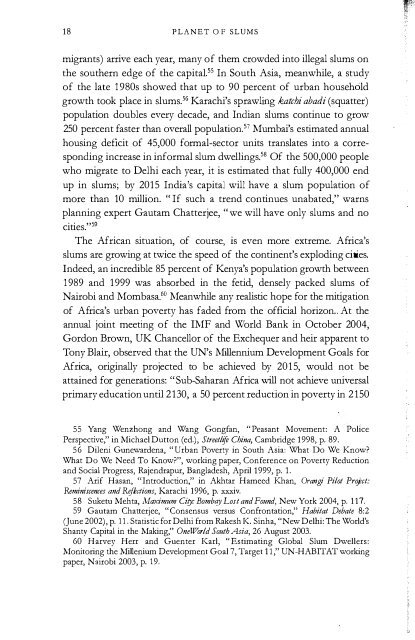Untitled - Rebel Studies Library
Untitled - Rebel Studies Library
Untitled - Rebel Studies Library
Create successful ePaper yourself
Turn your PDF publications into a flip-book with our unique Google optimized e-Paper software.
18 PLANET OF SLUMS<br />
migrants) arrive each year, many of them crowded into illegal slums on<br />
the southern edge of the capitaL 55 In South Asia, meanwhile, a study<br />
of the late 1980s showed that up to 90 percent of urban household<br />
growth took place in slums.56 Karachi's sprawling katchi abadi (squatter)<br />
population doubles every decade, and Indian slums continue to grow<br />
250 percent faster than overall population. 57 Mumbai's estimated annual<br />
housing deficit of 45,000 formal-sector units translates into a corresponding<br />
increase in informal slum dwellings.58 Of the 500,000 people<br />
who migrate to Delhi each year, it is estimated that fully 400,000 end<br />
up in slums; by 2015 India's capital will have a slum population of<br />
more than 10 million. "If such a trend continues unabated," warns<br />
planning expert Gautam Chatterjee, "we will have only slums and no<br />
cities." 59<br />
The African situation, of course, is even more extreme. Africa's<br />
slums are growing at twice the speed of the continent's exploding ci1ies.<br />
Indeed, an incredible 85 percent of Kenya's population growth between<br />
1989 and 1999 was absorbed in the fetid, densely packed slums of<br />
Nairobi and Mombasa.60 Meanwhile any realistic hope for the mitigation<br />
of Africa's urban poverty has faded from the official horizon. At the<br />
annual joint meeting of the IMF and World Bank in October 2004,<br />
Gordon Brown, UK Chancellor of the Exchequer and heir apparent to<br />
Tony Blair, observed that the UN's Millennium Development Goals for<br />
Africa, originally projected to be achieved by 2015, would not be<br />
attained for generations: "Sub-Saharan Africa will not achieve universal<br />
primary education until 2130, a 50 percent reduction in poverty in 2150<br />
55 Yang Wenzhong and Wang Gongfan, "Peasant Movement: A Police<br />
Perspective," in Michael Dutton (ed.), Streetlift China, Cambridge 1998, p. 89.<br />
56 Dileni Gunewardena, "Urban Poverty in South Asia: What Do We Know?<br />
What Do We Need To Know?", working paper, Conference on Poverty Reduction<br />
and Social Progress, Rajendrapur, Bangladesh, April 1999, p. 1.<br />
57 Arif Hasan, "Introduction," in Akhtar Hameed Khan, Orangi Pilot Project:<br />
Reminiscences and Reflections, Karachi 1996, p. xxxiv.<br />
58 Suketu Mehta, Maximum City: Bombay Lost and Found, New York 2004, p. 117.<br />
59 Gautam Chatterjee, "Consensus versus Confrontation," Habitat Debate 8:2<br />
(June 2002), p. 11. Statistic for Delhi from Rakesh K. Sinha, "New Delhi: The World's<br />
Shanty Capital in the Making," OneWorld South Asia, 26 August 2003.<br />
60 Harvey Herr and Guenter Karl, "Estimating Global Slum Dwellers:<br />
Monitoring the Millenium Development Goal 7, Target 11," UN-HABITAT working<br />
paper, Nairobi 2003, p. 19.<br />
THE URBAN CLIMACTERIC 19<br />
and the elimination of avoidable infant deaths until 2165."61 By 2015<br />
Black Africa will have 332 million slum-dwellers, a number that will<br />
continue to double every fifteen years.62<br />
Thus, the cities of the future, rather than being made out of glass<br />
and steel as envisioned by earlier generations of urbanists, are instead<br />
largely constructed out of crude brick, straw, recycled plastic, cement<br />
blocks, and scrap wood. Instead of cities of light soaring toward heaven,<br />
much of the twenty-first-century urban world squats in squalor, surrounded<br />
by pollution, excrement, and decay. Indeed, the one billion<br />
city-dwellers who inhabit postmodern slums might well look back with<br />
envy at the ruins of the sturdy mud homes of C;:atal Hiiyiik in Anatolia,<br />
erected at the very dawn of city life nine thousand years ago.<br />
61 Gordon Brown quoted in Los Angeles Times, 4 October 2004.<br />
62 UN statistics quoted in John Vidal, "Cities Are Now the Frontline of Poverty,"<br />
Guardian, 2 February 2005.


